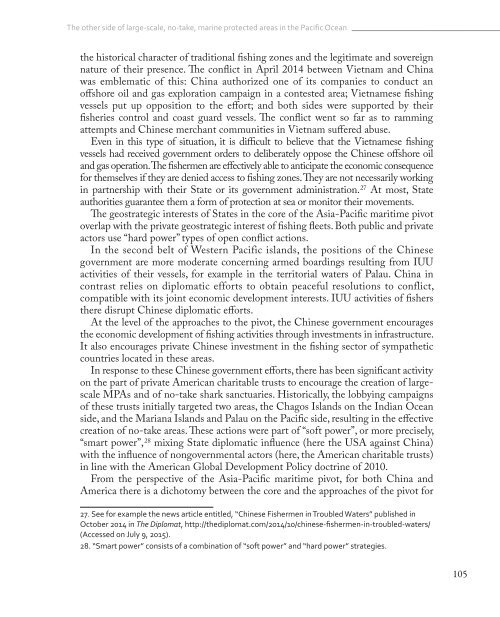Fisheries in the Pacific
Fisheries_in_the_Pacific
Fisheries_in_the_Pacific
Create successful ePaper yourself
Turn your PDF publications into a flip-book with our unique Google optimized e-Paper software.
The o<strong>the</strong>r side of large-scale, no-take, mar<strong>in</strong>e protected areas <strong>in</strong> <strong>the</strong> <strong>Pacific</strong> Ocean<br />
<strong>the</strong> historical character of traditional fish<strong>in</strong>g zones and <strong>the</strong> legitimate and sovereign<br />
nature of <strong>the</strong>ir presence. The conflict <strong>in</strong> April 2014 between Vietnam and Ch<strong>in</strong>a<br />
was emblematic of this: Ch<strong>in</strong>a authorized one of its companies to conduct an<br />
offshore oil and gas exploration campaign <strong>in</strong> a contested area; Vietnamese fish<strong>in</strong>g<br />
vessels put up opposition to <strong>the</strong> effort; and both sides were supported by <strong>the</strong>ir<br />
fisheries control and coast guard vessels. The conflict went so far as to ramm<strong>in</strong>g<br />
attempts and Ch<strong>in</strong>ese merchant communities <strong>in</strong> Vietnam suffered abuse.<br />
Even <strong>in</strong> this type of situation, it is difficult to believe that <strong>the</strong> Vietnamese fish<strong>in</strong>g<br />
vessels had received government orders to deliberately oppose <strong>the</strong> Ch<strong>in</strong>ese offshore oil<br />
and gas operation. The fishermen are effectively able to anticipate <strong>the</strong> economic consequence<br />
for <strong>the</strong>mselves if <strong>the</strong>y are denied access to fish<strong>in</strong>g zones. They are not necessarily work<strong>in</strong>g<br />
<strong>in</strong> partnership with <strong>the</strong>ir State or its government adm<strong>in</strong>istration. 27 At most, State<br />
authorities guarantee <strong>the</strong>m a form of protection at sea or monitor <strong>the</strong>ir movements.<br />
The geostrategic <strong>in</strong>terests of States <strong>in</strong> <strong>the</strong> core of <strong>the</strong> Asia-<strong>Pacific</strong> maritime pivot<br />
overlap with <strong>the</strong> private geostrategic <strong>in</strong>terest of fish<strong>in</strong>g fleets. Both public and private<br />
actors use “hard power” types of open conflict actions.<br />
In <strong>the</strong> second belt of Western <strong>Pacific</strong> islands, <strong>the</strong> positions of <strong>the</strong> Ch<strong>in</strong>ese<br />
government are more moderate concern<strong>in</strong>g armed board<strong>in</strong>gs result<strong>in</strong>g from IUU<br />
activities of <strong>the</strong>ir vessels, for example <strong>in</strong> <strong>the</strong> territorial waters of Palau. Ch<strong>in</strong>a <strong>in</strong><br />
contrast relies on diplomatic efforts to obta<strong>in</strong> peaceful resolutions to conflict,<br />
compatible with its jo<strong>in</strong>t economic development <strong>in</strong>terests. IUU activities of fishers<br />
<strong>the</strong>re disrupt Ch<strong>in</strong>ese diplomatic efforts.<br />
At <strong>the</strong> level of <strong>the</strong> approaches to <strong>the</strong> pivot, <strong>the</strong> Ch<strong>in</strong>ese government encourages<br />
<strong>the</strong> economic development of fish<strong>in</strong>g activities through <strong>in</strong>vestments <strong>in</strong> <strong>in</strong>frastructure.<br />
It also encourages private Ch<strong>in</strong>ese <strong>in</strong>vestment <strong>in</strong> <strong>the</strong> fish<strong>in</strong>g sector of sympa<strong>the</strong>tic<br />
countries located <strong>in</strong> <strong>the</strong>se areas.<br />
In response to <strong>the</strong>se Ch<strong>in</strong>ese government efforts, <strong>the</strong>re has been significant activity<br />
on <strong>the</strong> part of private American charitable trusts to encourage <strong>the</strong> creation of largescale<br />
MPAs and of no-take shark sanctuaries. Historically, <strong>the</strong> lobby<strong>in</strong>g campaigns<br />
of <strong>the</strong>se trusts <strong>in</strong>itially targeted two areas, <strong>the</strong> Chagos Islands on <strong>the</strong> Indian Ocean<br />
side, and <strong>the</strong> Mariana Islands and Palau on <strong>the</strong> <strong>Pacific</strong> side, result<strong>in</strong>g <strong>in</strong> <strong>the</strong> effective<br />
creation of no-take areas. These actions were part of “soft power”, or more precisely,<br />
“smart power”, 28 mix<strong>in</strong>g State diplomatic <strong>in</strong>fluence (here <strong>the</strong> USA aga<strong>in</strong>st Ch<strong>in</strong>a)<br />
with <strong>the</strong> <strong>in</strong>fluence of nongovernmental actors (here, <strong>the</strong> American charitable trusts)<br />
<strong>in</strong> l<strong>in</strong>e with <strong>the</strong> American Global Development Policy doctr<strong>in</strong>e of 2010.<br />
From <strong>the</strong> perspective of <strong>the</strong> Asia-<strong>Pacific</strong> maritime pivot, for both Ch<strong>in</strong>a and<br />
America <strong>the</strong>re is a dichotomy between <strong>the</strong> core and <strong>the</strong> approaches of <strong>the</strong> pivot for<br />
27. See for example <strong>the</strong> news article entitled, “Ch<strong>in</strong>ese Fishermen <strong>in</strong> Troubled Waters” published <strong>in</strong><br />
October 2014 <strong>in</strong> The Diplomat, http://<strong>the</strong>diplomat.com/2014/10/ch<strong>in</strong>ese-fishermen-<strong>in</strong>-troubled-waters/<br />
(Accessed on July 9, 2015).<br />
28. “Smart power” consists of a comb<strong>in</strong>ation of “soft power” and “hard power” strategies.<br />
105


